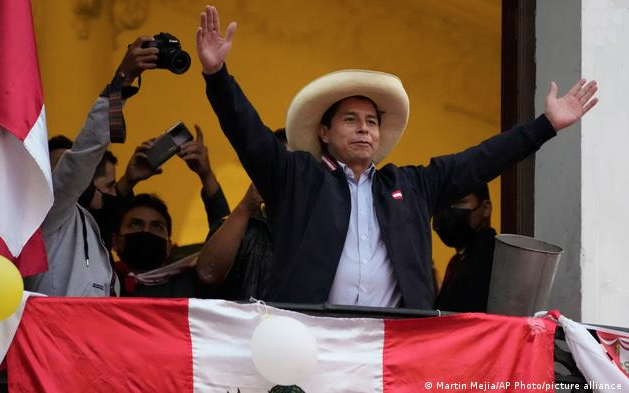The president-elect of Peru, Pedro Castillo, seems to have overcome the many obstacles put in his way by Keiko Fujimori, the loser in the second round of the June 6 elections. Once proclaimed winner by the electoral body, after a narrow victory by barely forty thousand votes among almost 19 million voters, Castillo will take office on July 28, when the country will commemorate the bicentennial of its independence. From then on, the new president will have to face the considerable challenges that await him during his five-year term.
Meanwhile, three weeks after her defeat, his opponent – daughter of dictator Alberto Fujimori sentenced to 25 years in prison for corruption and human rights violations – has not acknowledged Castillo’s victory. Keiko Fujimori maintains that a fraud has harmed her, continues to organize protest marches – which have already resulted in one death among her opponents – and has filed multiple appeals without evidence that have had no effect. The United States, the European Union and international observers have highlighted the transparency of the elections.
Castillo’s challenges
Castillo, however, must prepare himself for a much tougher phase, when several fronts will be open to him in a social context where demands for solutions are multiplying. Currently, several social conflicts affect various sectors of society, but mainly the extractive industries. In May of this year, the Ombudsman’s Office identified 191 conflicts, which may increase with the arrival of the new government.
In the first place, Castillo’s mandate is legitimate, but with the support of 50.1% of the electorate it is insufficient to undertake a major transformation. Secondly, the party that presented him as candidate adheres to a conservative Marxism-Leninism in matters such as family and gender, and maintains an anachronistic program. And thirdly, the first round of elections defined that there are ten parties occupying seats in Congress. In this context, heading the Executive Branch will not be enough to bring about a radical change.
Pedro Castillo knows this. He is a man of humble origins, a teacher and an evangelical who comes from a small Andean village where he worked until now. In two hundred years of independent life, the country has never seen a man with this profile reach the presidency.
Castillo trained as a union leader of the teachers’ union and, when he decided to enter politics, he intended to form a party on the basis of the country’s teachers, who number more than half a million. The task of collecting signatures, in order to register the party with the electoral authorities, was interrupted in 2020 by the restrictions imposed by the pandemic. It was then when leaders of Peru Libre -a regional party in the center of the country with electoral registration- offered him the candidacy, since the founder of the party and candidate to aspire to the position had just been sentenced by the justice system due to his mismanagement of public funds.
The ghosts of communism
To the radical ideology of Peru Libre was added the participation of teachers linked to MOVADEF -a grouping that seeks through legal means what the Communist Party of Peru-Sendero Luminoso (Shining Path)- set out to achieve with weapons, which caused the main media to identify Castillo with communism. This planted the idea that if elected, the country would become a Venezuela.
Although the campaign in favor of Keiko Fujimori was fueled by fear of communism and contempt for the peasant teacher, the majority ended up choosing the candidate who most resembled them.
“The professor” does not hide his limitations and has taken refuge in speeches that abound in generalities. Hence, some commentators agree in pointing out that it is not known what he will do in office. However, in May he presented a government plan for the first 100 days that avoids radicalism but maintains the need to review the contracts that grant excessively favorable treatment to mining and gas exploitations.
What will the ruling party’s bench be like?
The recent rapprochement of advisors of the educated left outside Peru Libre, has toned up the definitions of the future government and has given rise to certain struggles with the leaders of the party, which anticipates another front in the internal government.
The fissure will probably be replicated in the parliamentary representation of Peru Libre, which has 37 congressmen out of a total of 130. Apparently, a portion of them was selected by Castillo himself and another by the leadership of Peru Libre, therefore, in the next few weeks it will be possible to know if the government has its own bench or if divisions will emerge.
If the 37 congressmen were to act unified, they would probably be joined by another 13 from the left and the center, which together would not reach a majority. The right, on the other hand, would have at least three forces with a total of 44 congressmen. Other three groups, with 36 parliamentarians, will probably split or agree with the right or the left according to their convenience.
Castillo will have to be very careful in order to, on the one hand, keep the Peru Libre bench united and, on the other hand, have the necessary flexibility to make agreements with the forces that show openness to circumstantial agreements. If he does not manage to walk along this narrow ledge, Congress could take advantage of any false step to vacate the presidency.
The business community is the other great challenge
An additional front is the business sector. Although there has been financial support from this sector for the campaigns of fear of communism, realism was imposed on Sunday 27th when an editorial in the conservative daily El Comercio said ‘enough’ to Fujimori’s unfounded claims of fraud.
Castillo’s announcement the day before that he had asked the current president of the Central Bank, Julio Velarde, to remain in office seems to have been decisive. The president-elect further stated: “We are not Chavistas, we are not communists, we are not going to take anyone’s property, it is false. We are democratic, we will respect governance, Peruvian institutionality”. The quotation of the dollar dropped and the Lima Stock Exchange rallied.
During this week there seems to have been a divorce between business interests and the political ambitions of those who claimed to represent them. The former, more realistic, seem to have accepted Castillo’s victory and are preparing to coexist with the new government.
But, of course, it will be a conditioned acceptance. In particular, businessmen will pay attention to the government’s handling of social conflicts and the search for solutions that are acceptable to the claimants and, at the same time, do not alarm the major economic interests. This will be another narrow road ahead for a government loaded with challenges.












